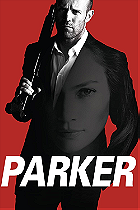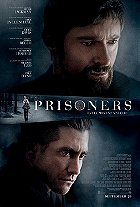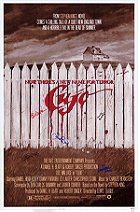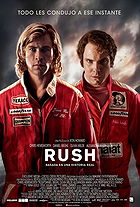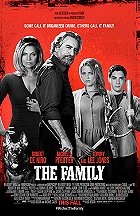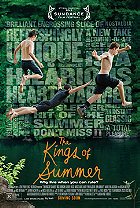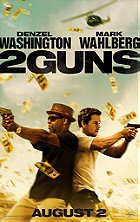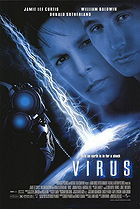Although Robert Rodriguez has demonstrated the ability to produce sophisticated motion pictures (Sin City), he predominantly partakes in moviemaking for the sheer fun of it, essentially making goofy backyard productions for millions of dollars with his actor friends. As a result, there's a unique brand of zeal and enthusiasm to Rodriguez's action movies, as they feel like the work of a non-cynical director who's out to provide a fun time and push the boundaries of ridiculousness with tongue firmly planted in cheek. Luckily, all of these idiosyncrasies are present in 2013's Machete Kills, another affectionate throwback to the sleazy grindhouse exploitation pictures worshipped by Rodriguez. Retaining its predecessor's proclivity for ultraviolence and over-the-top action, and amplifying the insanity, it's a total blast, showing yet again that nobody does cheesy grindhouse-style cinema like Rodriguez.

Recruited by the President of the United States (Charlie Sheen), Machete Cortez (Danny Trejo) is sent to Mexico on a mission to assassinate Mexican drug lord Mendez (Demian Bichir). Mendez is determined to destroy Washington with a hijacked missile, but Machete cannot kill the madman, as the missile's countdown clock is connected to Mendez's heartbeat. Machete is therefore forced to transport Mendez back into America alive to defuse the bomb, but a bounty is soon offered for the heads of both men, forcing Machete to fight for his life. Upon realising that Mendez is only a patsy, Machete turns his attention to Luther Voz (Mel Gibson), a crazy weapons manufacturer who hopes to destroy the world and repopulate it with his race of superior beings.
To state the obvious, the Machete flicks are not built for Academy Awards consideration; instead, Rodriguez aspires to deliver dumb fun filled with action, gore and nudity for viewers who like this brand of cartoonish escapism. Once again, Rodriguez displays a magnificent sense of invention throughout the action set-pieces, with moments that often go beyond outright preposterous, but it's all pitched at the right tone. For crying out loud, on top of limbs being chopped up by boat engines and helicopter blades, there's even a "Swiss Army" machete and a bra worn by Sofía Vergara that shoots knives and bullets. Thankfully, the pacing is so brisk, and the material is so affectionately goofy that it's hard to hold any of this outlandishness against the flick since Rodriguez is just following through with what was promised on the tin.

Surprisingly, for what was ostensibly just another fun Robert Rodriguez action flick, the original Machete was instilled with a certain degree of depth and heart, making it feel more substantial than Rodriguez's typical output. Machete Kills is a bit more on the slight side, however, backgrounding the political grandstanding to allow Rodriguez to just cut loose and have fun. There are still messages, sure, but it's minor subtext; as a result, this is more of a dumb action film with a few things on its mind. The story of Machete Kills is completely scattershot, and it literally feels like the script was written on the fly, with Rodriguez and credited writer Kyle Ward likely coming up with goofy bits and pieces mere minutes before shooting. A considerable chunk of time is actually devoted to setting up the planned third movie in the series (Machete Kills Again...In Space), transitioning from a regular B-grade actioner into a campy Moonraker-inflected sci-fi adventure.
Machete Kills is frequently amusing, with Machete's blunt one-liners ("Machete don't smoke," "Machete don't fail"), the cornball characters (Mendez has multiple personality disorder, regularly switching between evil, good and neutral), in-jokes (Charlie Sheen is the President?!) and hilarious quirks to show how badass Machete truly is (while hanging from a noose, he just nonchalantly stares at his would-be killers, completely unaffected). Voz is even a self-proclaimed Star Wars fan, and the proposed third picture promises scenes of Trejo hacking up goons with a machete-shaped lightsaber. (Rodriguez, if you're reading, please follow through and complete the trilogy!) If there's anything to criticise about Machete Kills, it's that the narrative is perhaps a bit too dense, leading to a few dry spots during which momentum flags, and we've left yearning for the next big action scene. Added to this, Rodriguez leans a bit too heavily on obvious digital blood effects when practical squibs would be far more suitable for this type of throwback effort.

Machete is vehemently a joke character, an opportunity for Rodriguez to position aging character actor (and long-time friend) Danny Trejo as a lady-attracting, super-human action hero despite his wrinkled face and stony demeanour. Trejo does not let us know he's in on the joke, committing to the ludicrous material with utter sincerity, which is what makes the film work. But he's shown up by Gibson, a perfect pick for the role of Voz. Gibson is clearly loving it, relishing the chance to play his first real villain role. He hams it up to extremes, playing Voz in the most deliriously over-the-top manner imaginable. He's the movie's secret weapon, lightening up the mood and keeping Machete Kills compelling for every second of his screen-time. Gibson is so good, in fact, that it's a shame he's only relegated to the final third. Like the first film, there's a lot of stunt casting here, with the likes of Cuba Gooding Jr., Antonio Banderas, William Sadler and Vanessa Hudgens showing up, while Lady Gaga has such a small cameo appearance that it's possible she was just hastily written in so Rodriguez could advertise the fact that Lady Gaga is in the fucking movie. Sheen is also fantastic, nailing the requisite demeanour for this type of endeavour, while Vergara wholly commits to her colourful supporting role.
Machete Kills is undeniably messy and, at times, pretty sloppy, with haphazard plot points and an astonishingly incoherent narrative, but it's all watchable and fun, even if it cannot be defended from a serious critical standpoint. Those who enjoyed 2010's Machete should enjoy this follow-up as well, as it offers more of the same in terms of cheesy casting and insane action set-pieces, and the presence of Mel Gibson is a stroke of genius.
7.1/10
 Login
Login
 Home
Home 183 Lists
183 Lists 1674 Reviews
1674 Reviews Collections
Collections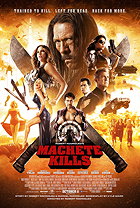
 0 comments,
0 comments, 



